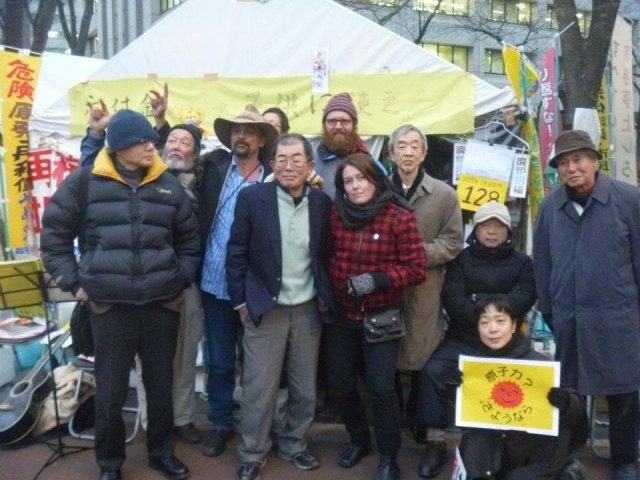
Five anti-nuclear activists travelled from Australia to attend the Global Conference for a Nuclear Power Free World held in the Japanese port city of Yokohama, over January 14–15.
The conference was attended by 11,500 people over the two days including 100 international participants from 30 countries.
The Australian delegation included Peter Watts, an Arabunna man and co-chair of the Australian Nuclear Free Alliance, Cat Beaton and Justin Tutty from the Northern Territory Environment Centre, Margaret Bevis from the Medical Association for the Prevention of War and Felicity Hill, who works for Greens WA Senator Scott Ludlam.
Watts addressed thousands of participants at the opening ceremony alongside other international guests including German member of the European parliament Rebecca Harms and Jordanian MP Motasem Awamleh.
Watts said he was sad to discover that uranium exported from Australia had been used at the Fukushima Daiichi nuclear plant, which had a severe radioactive meltdown in March last year.
He spoke of his great sympathy and solidarity with the people of Fukushima and his family’s experience of radioactive fallout from the Maralinga bomb tests conducted by Britain in South Australia in the 1950s and '60s.
His sentiments reflected those of Mirrar elder Yvonne Margarula who wrote to UN Secretary-General Ban Ki-Moon last year expressing the ongoing opposition of the Mirrar people to the Ranger uranium mineon their traditional lands.
Australian uranium fuels Fukushima
Watts said “all of the world’s nuclear problems begin with mining”. This was the central message of the Australian delegation and formed the title of the well-attended workshop organised by the delegates, Australia’s Uranium: Fuelling Japan’s Nuclear Reactors.
The workshop responded in part to revelations on October 31 last year by Dr Robert Floyd, director-general of the Australian Safeguards and Non-proliferation Office, that Australian uranium had been present “at the Fukushima Daiichi site and in each of the reactors”.
Delegates gave an overview of the uranium mining industry in Australia and industry plans for expansion.
They explained the plans by the Australian Labor government to build a nuclear waste dump at Muckaty station in the Northern Territory despite the objections of most traditional owners.
The speakers outlined the effects of uranium mining such as poisoning land and water, damaging sacred sites, adversely affecting the health of workers and fuelling the nuclear fuel cycle of the production of waste and weapons.
Tutty said the conference brought together “the thousands of citizens becoming politically active for the first time”.
While assisting the delegation in staffing an information booth, I spoke to many people from Japan who were moved to attend the conference because of the Fukushima disaster and came to learn more about the entire nuclear cycle.
Hundreds of visitors to the Australian booth signed postcards calling on Prime Minister Julia Gillard to halt uranium exports to Japan. These postcards will be presented to the prime minister later this year.
Occupy Kasumigaseki
After the conference, we visited the Keisanshomae Tent Plaza outside the Ministry of Economy, Trade and Industry in Tokyo’s government district of Kasumigaseki.
Anti-nuclear activists have maintained a 24-hour sit in protest outside the ministry since September 11 last year. The Ministry of Economy, Trade and Industry has played a key role in pushing the development of the nuclear industry in Japan.

We had a chance to talk with women from Fukushima who were visiting Tokyo to lobby members of parliament. They shared with us their struggle to go on living in the Fukushima area and carry on the fight against the nuclear industry.
They also spoke of the inner conflict over whether to stay in Fukushima and explained how many Fukushima residents who chose to remain in the area try to leave the heavily contaminated zone periodically to rest and recuperate.
Activists at the sit-in said they are often harassed by police and right-wing uyoku thugs. They at times operate in tandem and come right inside the tents to intimidate activists.
Tokyo police have taken an aggressive stance to the anti-nuclear movement. Twelve activists were arrested at an anti-nuclear demonstration in September last year. Japan’s political police, the kōan, continually monitor anti-nuclear demonstrations and collect information on activists.
A global movement against a global industry
While visiting the sit-in we shared our common struggles and the negative effects this industry was having in both countries.
The prominent “Occupy Kasumigaseki” flag at the sit-in site showed the protesters' solidarity with the global Occupy movement that has brought together people struggling against the effects of capitalism, of which the nuclear industry is a part, around the world.
The activists said the Japanese media have paid little attention to the protesters and visits from international media and activists are an important way for them to share their message.
As an international event, the conference demonstrated the strength of the global anti-nuclear movement and developed the sense of solidarity between anti-nuclear activists in different regions.
As South Korean environmentalist Choi Yul told the Japan Times, “it’s not really effective to raise the voice just within my country”.
The anti-nuclear movement needs to continue to develop networks of solidarity across the world to counter this global industry. As the experiences of the alter-globalisation movement, the peace movement and the recent Occupy movement have shown us, it is important that our networks be “as global as capital” to challenge the diffuse sites of capitalist and nuclear-state power.
The Yokohama conference concluded with the “Yokohama Declaration for a Nuclear Power Free World”.
This statement called for action throughout the world on March 11 to “protest the treatment of the citizens of Fukushima and call for a nuclear power free world”.
Large demonstrations are being organised in Japan and solidarity actions are also being planned across Australia.
[For more information please www.11march.com.]
Comments
Anonymous replied on Permalink